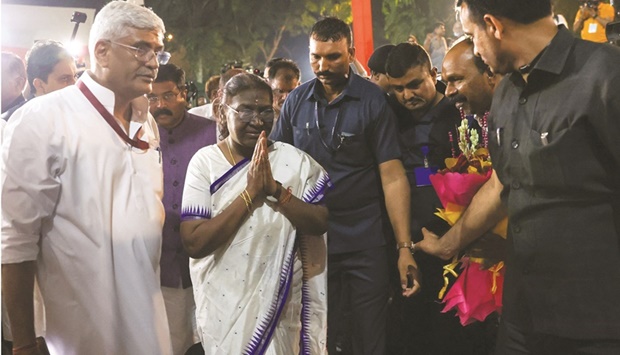Lawmakers chose yesterday India’s first president from the country’s tribal communities, which could boost the appeal of Prime Minister Narendra Modi’s party among marginalised groups ahead of the 2024 general election.
Droupadi Murmu, a 64-year-old teacher turned politician, takes office on July 25 at the start of a five-year term.
More than 4,500 state and federal lawmakers voted in the presidential election on Monday.
The ballots were counted yesterday.
Murmu’s victory was assured as she was backed by Modi’s Bharatiya Janata Party (BJP), which dominates federal and state politics.
“A daughter of India hailing from a tribal community born in a remote part of eastern India has been elected our President!” Modi said on Twitter.
Modi wrote that Murmu’s “exemplary success motivates each and every Indian”.
“She has emerged as a ray of hope for our citizens, especially the poor, marginalised and the downtrodden,” he wrote.
Born into a family of the Santhal tribe from the state of Odisha, Murmu started her career as a school teacher and actively participated in community issues.
She later joined mainstream politics and served as a BJP state lawmaker in Odisha before becoming governor of the eastern state of Jharkhand.
Her election is seen as the BJP’s outreach to India’s tribal communities, which comprise more than 8% of its 1.4bn people.
“The BJP will want to offset any anti-incumbency of the last 10 years in 2024, and one of the ways to do that is to go for a new vote-base,” political columnist Neerja Choudhary told Reuters.
Murmu beat the opposition candidate Yashwant Sinha, a former BJP finance minister and now a fierce critic of Modi, winning nearly twice as many votes.
Sinha also tweeted his congratulations.
“India hopes that as the 15th President of the Republic she functions as the custodian of the Constitution without fear or favour,” Sinha wrote.
Murmu will be the country’s second woman president after Pratibha Patil, who held the position for five years from 2007.
She succeeds Ram Nath Kovind, the second president from the Dalit community, the bottom of the Hindu caste system.
“As a tribal woman from remote Mayurbhanj district, I had not thought about becoming the candidate for the top post,” she told reporters soon after her nomination this month.
“We’ve been on the road fighting for tribal rights since the 90s,” activist Dayamani Barla told AFP, adding: “Whatever agenda the BJP... has to place a politician from a tribal community in the post of the president, she will only be able to do anything if she is allowed to use her pen.”
The prime minister and the cabinet wield executive powers in India, although the head of state can send back a few parliamentary bills for reconsideration and also helps in the process of forming governments.
“Sitting on the seat is not as big a deal as much as it is having the power to actually use your position,” said Barla.

President-elect Droupadi Murmu arrives at a welcoming ceremony in New Delhi.
